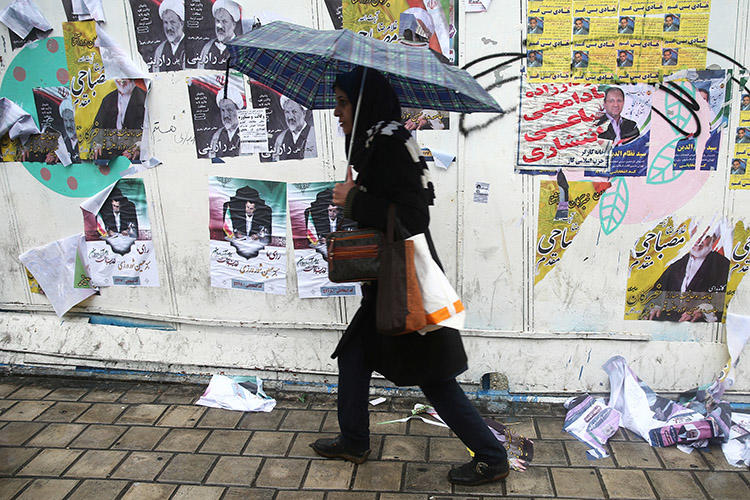The space for press freedom has become more repressive as Iran faces the biggest challenge to its rule in its 41-year history following massive protests over economic hardships, the threat of war with the U.S. over the killing of prominent Iranian general Qasem Soleimani in January, and strategic miscalculations in the shooting down of a Ukrainian passenger plane the same month.
CPJ has previously documented how Iran—one of the most censored countries in the world—works to silence or obstruct journalists through arrests, intimidation, revoking press credentials, temporary detentions, internet shutdowns, and applying pressure on relatives.
In the lead up to the election this pressure increased, with authorities raiding journalists’ homes or using accusations of false news and national security to silence would-be critics. In other cases, courts imposed heavy prison sentences then released journalists on bail, leaving them technically free but often scared into silence.
This month, Iran’s Revolutionary Guard Corps’ intelligence wing raided the homes of at least five journalists and Tehran’s Media Court convicted three editors of “spreading false news” and “defamation.” The timing of this and other media-related court cases and crackdowns suggests Iran was mounting pressure on journalists to try to control criticism ahead of the elections.
In a February 10 statement, Tehran’s Freelance Journalist Union noted that ahead of the election, security forces harassed several journalists including Pejman Mousavi, editor-in-chief of the cultural magazine Morvarid (Pearl), Amir Babaei, a freelance reporter, and Mehdi Mahmoudian, a freelancer and political activist. It added that on February 3, Khosrow Sadeghi Borojeni, a freelance columnist and sociologist, was sentenced to eight years in prison. CPJ’s review of their cases found that authorities accused at least four of the journalists of crimes including “propaganda,” “false news” and “acting against national security.”
Authorities have also targeted the families of journalists in recent weeks. Revolutionary Guard members not only raided the home of Ehsan Bodaghi, a parliamentary reporter of the official Iran Newspaper, on February 6, they also searched the homes of his parents and in-laws.
A person familiar with the case and who, like nearly all those with whom CPJ spoke, asked not to be named for fear of retaliation, said, “Ten IRGC agents raided Ehsan’s home at 8 a.m. and ransacked the entire house for five hours, while his wife and his young child were cornered by the agents. Eventually, they confiscated his and his wife’s cellphones and laptops and his press credential.”
The person, who lives in Tehran, told CPJ, “When his wife resisted giving them her laptop password, she was told that although she is not a journalist, there is an open case against her as well and she will have to soon appear before the court.”
A journalist from the semi-official Iranian Labour News Agency (ILNA), whose former colleague and friend Yasaman Khaleghian also had her home raided, told CPJ that while not many journalists are in custody, an imminent threat of legal action means they are far from free.
“Our colleagues have to go through long hours of extreme interrogations every day of the week, being threatened with their lives, their loved ones and their private life, but on paper they are free and are not sitting in jail,” the news agency journalist said. “This is good for the government’s record internationally, isn’t it?”
A journalist at a Tehran-based reformist newspaper said that the repressive climate for the press makes covering the elections hard and that some journalists chose not to cover the elections to avoid retaliation.
“Our newspaper is in its worst shape ever. Even worse than in the 2009 election. The situation is very frustrating. Only five reporters are left in the newsroom and a couple of editors. It is obvious that the editor-in-chief has been ordered not to create any content about the election,” the journalist said.
“People don’t buy newspapers anymore. They lost their confidence in all government-run media. They don’t blame us. People are smart enough to know we can’t work in a closed, suffocating environment. Then government threatens foreign-based Iranian journalists and calls them mercenaries,” the Tehran-based journalist added.
The journalist referred to a recent tweet by Hesameddin Ashena, an adviser to President Hassan Rouhani. In the tweet, Ashna warned that a low turnout would cause new problems for the country and its citizens, including increased budgets for foreign-based media outlets that the regime considers antagonistic.
While the regime is doing all it can to eliminate journalism domestically, the reality is that the foreign-based media that officials consistently denounce are quickly becoming the sole source of credible news in Iran.
“Independent journalism is slowly dying in Iran. The regime has gotten rid of the brave editors, some have merged into the system to receive government incentives. There is no independent media,” said a Tehran-based journalist who works for an economic newspaper. “Now expressing themselves on social media is the only platform for defenseless journalists and that comes with a very high cost.”
